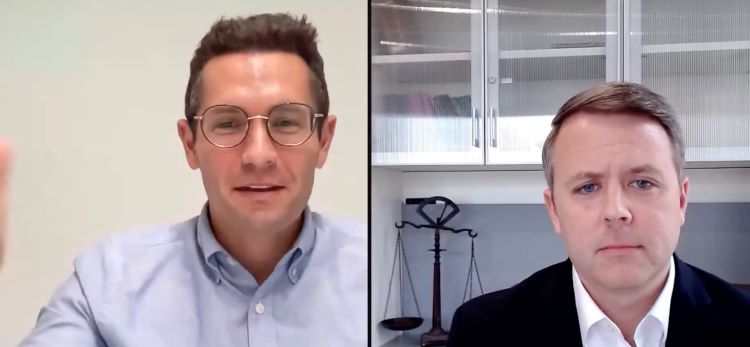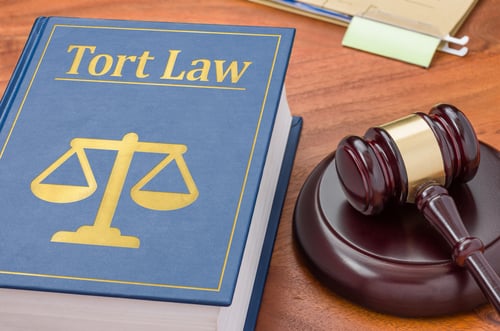Mighty Big Fight: Tech company that services PI lawyers sets up law firm to compete with them

Personal injury attorney Darl H. Champion debates with Mighty CEO Joshua Schwadron.
At the beginning of a livestreamed debate in August, Joshua Schwadron, the founder and CEO of tech company Mighty, smiled and looked relaxed as he introduced his opponent, personal injury lawyer Darl H. Champion.
“There are a number of PI lawyers all around the country who have offered critiques about the Mighty model and some of the marketing we’ve been doing,” said Schwadron, who earned his JD from Emory University School of Law in 2006 but has never practiced personal injury law. “None of them were willing to accept invitations by me to speak. I applaud you for that.”
Although Schwadron framed it as a debate about problems in the personal injury industry, they were also there to talk about the backlash against his company. Since 2018, Mighty has provided personal injury lien management software to attorney financiers and medical providers. In 2020, it began offering the same tech to lawyers and law firms.
But the CEO abruptly announced in June that Mighty was launching a new consumer-facing platform and working with an affiliated but separately owned law firm called Mighty Law. They would compete against the thousands of lawyers Mighty had served.
Not only that, but Mighty also said it was blowing the whistle on the industry’s bad behavior and the shady “billboard lawyers” who are selling their clients short.
Even though Schwadron was magnanimous at the start of the debate, it didn’t take long for the two men to start firing shots at each other. Schwadron’s smile started to feel forced. And his posture stiffened as the debate became more and more testy.
“Mighty isn’t the answer,” Champion said as part of an early broadside. “With Mighty’s business model, it’s going to be a settlement mill on steroids.”
To Champion, who runs a small firm in Marietta, Georgia, it felt as if Mighty was taking cheap shots to make a splash, using ambulance-chasing caricatures in its marketing to tar the whole personal injury bar with the same brush.
“People feel a little betrayed,” Champion told the ABA Journal in an interview after the debate. “Mighty has made its money in the personal injury world by developing relationships with these firms. Then they came in and dumped on an entire industry.”
Still, Schwadron insists he doesn’t have it in for personal injury lawyers. Instead, he sees himself as a disrupter in an industry that he says is secretive and opaque.
“I have good friends who are personal injury lawyers,” Schwadron says. “But they have bad incentives. And those bad incentives lead to bad behavior.”
During the debate, Schwadron highlighted some of those incentives, accusing lawyers and firms of sending clients to get MRIs after an accident even if treatment is not needed.
“Those clients bear that cost of the MRI, and it comes out of the settlement,” Schwadron said. “The client that gets an MRI where something is discovered, those cases are worth more. The lawyer makes more money. I think that’s a terrible practice.”
 Image from Shutterstock.
Image from Shutterstock.
Turf protection?
Mighty markets itself as a one-stop shop for people who want to make a claim after being in an accident. The company says it can arrange loans for people to cover rent, property damage claims and other basic needs.
The company also says it charges rates 10% lower than “the industry standard,” and it will never bill clients more than 30% of a gross settlement that is resolved out of court or 36% for a case that goes to court. In contrast, it claims “billboard lawyers” charge 33% and 40%, respectively.
“[Mighty] lawyers agree to not have any quid pro quo relationships with doctors. They agree not to accept any sports tickets, dinners or anything else paid for by them. And they also agree to disclose any preexisting relationships with doctors that they have,” Schwadron says.
University of Texas at Austin School of Law professor Charles M. Silver, an expert on civil procedure and professional responsibility, believes Mighty could be facing a backlash because it is trying something new.
“It’s turf protection. Lawyers have been protecting turf since there have been lawyers,” Silver says, adding, “it’s no better when it’s done by the legal profession than by anybody else.”
Mighty Law is currently accepting clients in Georgia, Texas Connecticut, Maryland, Illinois, Arizona and Alabama. There is no common ownership between Mighty the tech company and Mighty the law firm, according to Schwadron.
The firm has already drawn the ire of national personal injury firm Morgan & Morgan, which also has offices in Georgia. According to Schwadron, the firm sent Mighty a cease-and-desist letter and threatened to sue for using the law firm’s name in keywords for online ads. He expects “attacks to intensify as we get bigger.”
Champion agrees that there are areas of the personal injury law industry that deserve scrutiny. But he says Mighty is not the solution.
“They don’t understand how personal injury cases work, how to get maximum value,” Champion says, adding that Schwadron is not a personal injury lawyer. “Then the problems they have identified, they don’t fix them. They make them worse.”
 Image from Shutterstock.
Image from Shutterstock.
He notes Mighty is backed by venture capital and has ties to the litigation funding market. A 2018 Insurance Journal article reported that billionaire George Soros had invested in Mighty Group, which “bundles cash advances that small shops extend to plaintiffs in personal injury suits.”
Champion says that “as far as he can tell,” Mighty never left the litigation funding market. He says some of the companies that have benefited from Mighty funding have offered presettlement loans that charge “ridiculously high” interest rates to clients.
And Champion doubles down on his argument that Mighty is a “settlement mill,” a derisive term for a firm or lawyer that prioritizes bringing in a high volume of cases and settling them early.
But Schwadron dismisses Champion’s claims.
“Mighty is certainly not a settlement mill and has top lawyers around the country who abide by a code of conduct that sets the standard of excellence in personal injury,” he says.
Mighty does provide financing to companies offering advance funding to plaintiffs, Schwadron says, as well as personal injury lawyers and medical providers. And while he concedes interest rates on those loans can be high, he also says they are a “valuable lifeline” for people who may lose their jobs after they have an accident.
“It’s also worth noting how hypocritical it is when PI lawyers criticize plaintiff advance companies for being expensive,” Schwadron said in an email. “When they take a case on contingency, they’re financing the client. And that can sometimes be the most expensive form of financing of them all.”
‘Shrouded in secrecy’
Atlanta personal injury lawyer Alex Hoffspiegel calls Mighty the “Uber of personal injury claims.” He doubts clients will get the same degree of attention that a smaller firm can bring.
But he credits Mighty for highlighting the bad practice of sending clients to medical providers when treatment is not justified. However, he says that is just “a tiny sliver of what goes on.”
And Stanford Law School professor Nora Freeman Engstrom, an expert in tort law and legal ethics, said Mighty should be praised for bringing “transparency to a system that’s frequently shrouded in secrecy.”
“Mighty is unusual insofar as it is transparent about the fees it charges. Nationally, most personal injury lawyers don’t publicize their contingency fee percentage—even on their websites,” Engstrom wrote in an email.
But she noted that Mighty was boasting about some practices that “don’t go beyond lawyers’ baseline obligations.”
Mighty says its lawyers will recommend a settlement only if it is in the client’s best interests.
“Lawyers are already duty-bound to prioritize their clients’ interests,” Engstrom said. “That’s lawyers ethics 101.”
Champion says debating Schwadron did nothing to shift his view on the company.
“This guy is going around trying to make it sound like it’s just these evil, greedy personal injury lawyers that are upset with them because they’re trying to do the right thing,” Champion says. “And that’s furthest from the truth.”
Write a letter to the editor, share a story tip or update, or report an error.


